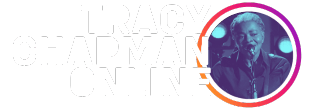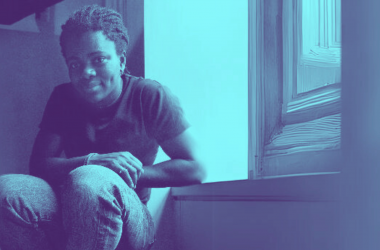TRACY CHAPMAN’S eponymous debut album was one of the biggest sellers of last year – more than ten years after its release. She spoke to PETER MURPHY about her life before and after fame, that album and the race issue.
JUST WHEN you think you’ve got a handle on the strange machinations of the music industry, another unforseen and unexplainable phenomenon occurs, confounding all logic. The most recent glitch in the graphs of pop theorists everywhere concerns Tracy Chapman, and the 1998 resurrection of her eponymous debut album, which returned to the upper echelons of the Irish charts (it’s been certified nine times platinum in this country, selling over 144,000 copies) more than a decade after its original release. The Ohio-born troubadour has released three albums (Crossroads, Matters Of The Heart and New Beginning) since that Billboard-topping, Grammy-nominated debut, but none have caught fire quite as spectacularly as Tracy Chapman.
“I don’t know that I can shed any light on that,” the singer smiles, holed up in a room in the Westbury Hotel on the last day of a string of sold-out gigs at Dublin’s Olympia. Dressed casually in sweatshirt, jeans and boots, long black dreadlocks framing her face, she comes across as a polite but rather humourless individual. It could be something to do with the fact that she’s recuperating from a cold which has caused her to reshuffle all press engagements: when the throat ails, the gigs must take priority. But, to get back to the platinum-coated point, why, ten years after that first flowering, is history repeating itself?
“I guess the most recent resurgence in the sales of the first record is in part due to the cover (of ‘Baby Can I Hold You’) by Boyzone,” she considers. “And also, from what I understand, the record company recently did this re-pricing of certain back catalogue albums, and that also probably had some influence; people were more willing to go back and try some music that they may not have checked out before.”
These are legitimate factors, but in addition the confessional singer/songwriter-friendly climate engendered by the success of Tori, Alanis, Jewel et al can’t have hurt. Interestingly though, the album itself hasn’t weathered all that well. Reviewing it in the cold light of December 1998, the obvious standout tracks (‘Talkin’ ‘Bout A Revolution’, ‘Fast Car’) still bear up well, but time hasn’t been especially kind to songs like ‘She’s Got Her Ticket’ and the a capella faux pas of ‘Behind The Wall’. Either ways, Chapman’s somewhat reluctant to dissect the goose with the golden guts.
“I can’t say, here or anyplace else, why people buy my records,” she shrugs. “I know why I buy records, if the music moves me, if I like the way it sounds, if I like what the person has to say. Sometimes you like it because it’s danceable. But I think there’s also some undefinable quality about music, there’s some way in which some artists’ music can move you, and you don’t even know why.”
Fair enough. Cast your mind back to the first time you heard Chapman’s debut single ‘Fast Car’ on the radio in the late 80s. Like it or not, the sense of grainy grey realism, not only in the lyric, but in Chapman’s voice, contrasted jarringly with the predominating Reaganomic radio-rock of Bon Jovi, pop-pap like Rick Astley or T’Pau’s foul power balladry. Here was a song as curious and conspicuous as dung deposited under a hobby horse.
“I think when you’re in the middle of it, when it’s your life, you don’t see it that way,” she counters. “I was simply doing pretty much what I had been doing for quite some time; I started writing songs and playing guitar when I was seven or eight years old, I wrote some of the songs on that album when I was 16, I had been playing the same kind of music until I made my first record, and surprisingly, I found this place in popular music. I really didn’t expect that any of my records would be as successful as they have been.
“The other thing is that when my record came out, things were changing,” she continues. “Right before my record, Suzanne Vega’s came out, so you started to have this new interest in singer-songwriters. And so I kinda feel like I was right there at the beginning of this new wave, in that people were going back to the way they had appreciated Bob Dylan and Joni Mitchell. I’m not comparing myself to them, but just in terms of singer-songwriters.”
Chapman was born on March 30th, 1964 in Cleveland, Ohio. Her mother was a singer of both popular and gospel music (“When I say she sang, a lot of people sing, but I think that my mother has a truly amazing voice,”) and this creative environment encouraged young Tracy to learn clarinet and guitar and begin writing poetry, prose and songs. However, her artistic bent did not prevent her from winning scholarships to Wooster School, Connecticut and Tufts University in Massachusetts. While studying anthropology and African studies, she cut her teeth on the coffee house scene in Boston, sharing stages with veteran folkies like Odetta and John Hammond Jr., as well as singing in the streets of Harvard Square. An introduction to Joe Jackson/Joan Baez/Graham Parker producer David Kershenbaum resulted in a deal with Elektra Records, and the two began working on her debut album in Los Angeles in the winter of 1987.
Although she has no especially fond memories of Massachusetts, the prevailing New England climate of political correctness did seem to have some influence on Chapman. Those with long enough memories may remember the indignance the singer inspired at her debut Irish gig in the Baggot Inn in early 1988. Irish Times journalist Kevin Courtney remembers it this way:
“There was much chattering as the dreadlocked diva took the stage armed only with an acoustic guitar. She didn’t start playing right away, however; with a withering glare, Chapman ordered every member of the audience to put out their cigarettes and to refrain from smoking throughout her performance. Since cigarette smoke was like air to the punters in the Baggot Inn, this decree drew a few gasps, but most of the crowd complied, and endured the lady’s set without the aid of nicotine. Thus did Tracy Chapman establish her politically correct credentials by striking fearlessly at that most cherished of Irish habits. But at least she didn’t tell us to pour our Guinness down the sink.”
Indeed, memories of this incident have ingrained themselves so deeply in the psyche of Irish hacks that your Hot Press correspondent spent ten minutes prior to this interview jogging up and down Grafton Street, flapping his arms, frantically trying to defumigate his clothing of cigarette smoke.
Anyway, by the time Tracy played Dublin again, clean air was not an issue – it was before an audience of 30,000 at the RDS, a double header with The Hothouse Flowers. By then, she had stood in for Stevie Wonder at the Nelson Mandela 70th Birthday Tribute concert at Wembley Stadium (selling 12,000 albums in the UK in the two days that followed) and Tracy Chapman had topped both the UK and US charts, becoming the year’s fastest selling CD stateside. By September, she had hooked up with the Amnesty International tour, playing alongside the likes of Peter Gabriel, Sting and Bruce Springsteen. By the following January, she had won Grammy awards for Best New Artist, Best Female Pop Vocal Performance and Best Folk Recording. Chapman admits that her rise was a little heady, but she managed to keep her wits about her.
“It changed the way other people related to me, that’s for sure,” she recalls. “It certainly gave me more attention than I’d ever received before, and I wasn’t that comfortable about it. And I’m not super-comfortable with it now, but I think I’ve started to find a way to . . . mainly it was a good thing. I was an anthropology major, so it wasn’t like there were many jobs waiting for me! I’d gone to school on scholarships, I’d worked and struggled all through school, had no money, so of course, that was a real welcome change. I was able to help my family, pay off my school loans, help my sister go to school, those were among the best things.”
Tracy Chapman received a staggering amount of critical acclaim, and even Neil Young (with whom she shared a manager, Elliot Roberts) added his seal of approval, playing on ‘All That You Have Is Your Soul’ from the follow-up, Crossroads. The likes of Bobby Womack, Vernon Reid of Living Colour, and members of Springsteen’s band, plus session stalwarts like Larry Klein, G.E. Smith and Russ Kunkel, were also queuing up to record with the ingenue. However, that second album was roundly panned by the press, although sales were relatively healthy.
“It wasn’t that unexpected, at least for me,” she reflects. “There were some people who thought the second record was more controversial, and others thought it wasn’t as good, and I think the record company certainly weren’t happy with that, but I guess I had no expectations that it would be received in the same way that the first record was. You can’t expect that people will like everything that you do, and I think also some part of the acclaim and success around the first record was due to the fact that it was the first. You’re only brand new one time.
“There is this tradition in the music industry of putting lots of pressure on artists about their second record, and in some ways I think it’ll never measure up. So, the only thing that . . . I wouldn’t say it hurt, but it disturbed me that some people didn’t understand, the way the media in the United States interpreted some of the songs incorrectly. It’s hard to find yourself misrepresented and not to have that much opportunity to correct it.”
Those misinterpretations led to Chapman – a staunch Amnesty supporter and social equality activist – acquiring a reputation as some kind of avenging angel with Black Panther politics and a flag to burn. For many white middle-class critics, black militancy was sexy coming from male rap acts, but not female folk singers. Indeed, around the time of the release of Matters Of The Heart in America, High School students were asked to write an essay on who they thought had made the biggest contribution to civil rights. Instead of applauding Chapman’s efforts, many of the essayists found her music offensive. The singer herself reckoned that “a lot of schools saw an interview and a video that I did, and some of them thought that it might incite people to do some violent act. I was really surprised because the majority of it was footage of black civil rights leaders and black boxers.”
When questioned about contemporaries like Ice T and Public Enemy, she admitted, “I don’t agree with all that rap or rock artists say. I hate music that is offensive or sexist. There is a lot of anger, rage and hatred that all people, and particularly black people, have and it is better to express it in music than to go out and do something violent. I don’t see how Public Enemy and Ice T’s statements might affect me negatively.”
All the same, Chapman had experienced her own fair share of discrimination, much of it during her time in Boston.
“I found it a very conservative place,” she remembers, “especially by contrast to San Francisco where I live now. I found in particular the racism in Boston was just intolerable. There is a history there, a pilgrim spirit of resistance. There’s definitely lip service given to being able to freely express opposing opinions, but when you live there, things are very different. It’s a very segregated city, there’s some very strict divisions between black and white people, and very strict class divisions as well.”
In latter years, Tracy Chapman, a woman with more “issues” than a Grafton Street magazine hawker, has become something of a figurehead for hiking boot-wearing, Bread & Circus-shopping, mulch-slurping pilgrims of every class and kidney. Indeed, her 1996 album New Beginning contained a coupon redeemable for a packet of seeds at any of her concerts. “Many of the songs on New Beginning share the themes of change, growth and renewal,” she explained at the time. “I wanted to do the photography for the album at an organic farm because I wanted to extend this metaphor for growth. I wanted to incorporate these images as a way of getting people to think about the potential and possibilities that exist in something as small as a seed.”
Chapman has also been given some credit – or blame – for being a forerunner of the Lilith Fair brigade, who, if nothing else, mob-handedly broke the stranglehold on the male-dominated US summer festival circuit. The singer gave the movement her blessing by appearing on the second tour alongside the likes of Sinead O’ Connor, Lisa Loeb and Alison Moyet.
“I’m not really sure that it’s the start of a phenomenon,” she muses. “They’ve had two Lilith Fairs, and it seems to me it’s still a little early to determine what the effect of those festivals will be. I mean, there were a lot of things going on in the summer concert scene that made that festival work when some of the others fell by the wayside. Lollapalooza, HORDE and OzFest had gone around so many times that they’d just played their audiences out, and the Lilith Fair thing was something new. And also, it tapped into an audience that really hadn’t been considered before. Other festivals I think mainly attracted teenage boys, college age men, but there was no-one really trying to play to all these girls out there – except the Spice Girls – so I think that was part of why it worked so well.”
Does she think she helped break ground for her fellow Lilith artists?
“Maybe, to some extent,” she fudges. “Who can say for sure? I think in the end, in the music business, people will listen to money, and if they think that something will sell, they’ll eventually get behind it.“.
© Peter Murphy


